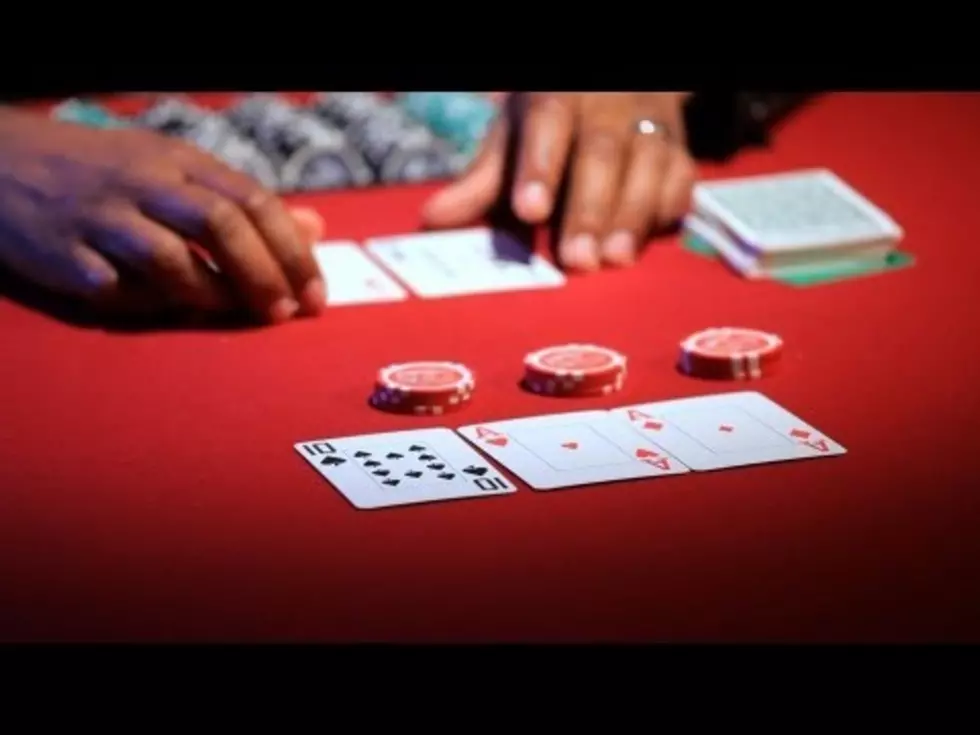
Mike Kasper is NOT Going to Jail!
I have been playing poker since I was a teenager. I used to get together with friends at their parents house about once a month while in high school. Never did I ever imagine that what I was doing was illegal in Idaho, but last year I was playing Texas Hold‘em at a buddy's. While watching the MLB all-star game, a Boise Police task force busted in, guns drawn to give us all gambling tickets.
I’m not making this up. I understand, gambling in Idaho is illegal, but Poker is not gambling, it is a game of skill and games of skill according to the law are excluded. I have played poker in the past with police officers and judges, so you can see my confusion. I finally had my day in court last month and the judge in the case, the honorable Judge James Cawthon, just released his decision.
Suffice it to say, I am a free man after the case was dismissed because the gambling statute as it applies to poker was ruled “unconstitutional”.
You can read below an article about the recent decision that appeared this week in Bloomberg, plus all the particulars about the case and the people involved. You can also read the entire official decision from the judge.
I am just happy to know that I can say: “Free at Last, free at last, thank gawd almighty, free at last!”
Good Poker Players Aren't Lucky
30May 19, 2014 4:35 PM EDT
The U.S. has somehow become a country in which poker players from Staten Island, New York, to Boise, Idaho, can’t risk a few hundred bucks in an honest game without fear of criminal prosecution.
Idaho is known for its libertarian streak. Recently, however, overzealous prosecutors and law enforcement officers in Boise tried to turn poker players into criminals, bringing misdemeanor gambling charges that would carry penalties of imprisonment and fines up to $1,000.
Few players can afford lawyers, so most plead guilty and pay the fines. Last November, though, two defendants -- Mike Kasper, a popular radio host, and Jared Leuzinger, a three-time state champion wrestler -- pleaded not guilty, on the grounds that poker is a game of skill exempt from Idaho’s anti-gambling statute, among other arguments. (They had pro bono lawyers and support from the Poker Players Alliance.)
Idaho Code 18-3802 prohibits gambling and 3801 defines gambling as “games of chance, including craps, roulette, poker, baccarat or keno, but does not include: (1) Bona fide contests of skill.” If poker is such a contest, it would not constitute “gambling” under the statutes.
On April 17, a pretrial hearing in the case was held in Judge James Cawthon’s courtroom on the defendants’ motion to dismiss the charges. In a four-hour session well-attended by members of Boise’s poker community, the defense examined witnesses who testified that in Idaho they regularly risked fees, some as high as $5,000, to enter pool, bass fishing and golf tournaments in which luck plays a role but skill is the dominant factor. They testified that although substantial cash prizes were awarded to the top finishers, gambling citations were never issued. (A bull rider scheduled to testify was unable to make the hearing.)
As an expert on poker, I submitted two recent statistical studies. (I was paid to research the evidence and confer with the defense before the hearing.) The first paper was “Economics of Poker: The Effect of Systemic Chance” (2012) by Robert Hannum, a professor of risk analysis and gaming at the University of Denver. His study of more than a billion hands of online Texas Hold’em found that 85.2 percent of the hands were decided without a show of cards. In other words, players’ betting decisions were of overwhelming importance in determining the outcome. Of the remaining 14.8 percent, almost half were won by a player who didn't hold the best hand but instead had induced the player with the best hand to fold before the showdown.
Hannum concluded: “Clearly the driving force behind the economic outcome of Texas Hold’em is skill rather than chance.”
The second study was “The Role of Skill Versus Luck in Poker: Evidence From the World Series of Poker” (2011) by Thomas Miles and Steven Levitt of the University of Chicago. During the 2010 World Series of Poker, 720 players identified beforehand as high-skilled earned an average return on investment of 30.5 percent, an average profit of more than $1,200 per player per event. The average return of all other players was minus 15.6 percent, a loss of more than $400 per event. Miles and Levitt noted that the divergent returns on investment were “highly statistically significant and far larger in magnitude than those observed in financial markets, where fees charged by money managers viewed as being the most talented can run as high as three percent of assets under management and thirty percent of annual returns.”
To help us appreciate the skill-to-luck ratio, the economists compared the win rate of high-skilled poker players, 54.9 percent, with that of baseball teams that made the playoffs the previous season -- which won 55.7 percent of their games against teams that failed to reach the postseason. “To the extent that baseball would unquestionably be judged a game of skill, the same conclusion might reasonably be applied to poker in light of the data,” Miles and Levitt wrote, concluding that there is “strong evidence in support of the idea that poker is a game of skill.”
The state of Idaho's own detective admitted on cross-examination that he has played poker for money with other detectives, and that poker is a game of skill. The prosecutor himself admitted in his closing statement that Texas Hold’em is legal in Idaho “under certain circumstances.” When pressed by Judge Cawthon to define those circumstances, he was unable to. The judge noted that the state had provided no rebuttal to the evidence that poker is a game of skill, and that its investigating officer had corroborated that evidence.
On May 15, Judge Cawthon dismissed the gambling charges against Kasper and Leuzinger. Ruling that the defense had provided “uncontroverted evidence” that poker is a “bona fide contest of skill,” he found that Idaho’s anti-gambling statue was void for vagueness as applied and that the state’s “prosecution under 18-3802 is unconstitutional as applied to these two individuals.” In essence the judge ruled that a statute that defines gambling to include poker but excludes games of skill is at odds with itself and therefore unconstitutional.
The case nudges Idaho, and perhaps other states, closer to understanding that the skill-to-luck ratio of America’s national card game makes it much more like playing baseball or the markets than like hoping a craps or keno or lottery number comes up. The federal treatment of poker has also been erratic -- sometimes even nonsensical –- and the new statistical research should open some eyes in Congress and at the Justice Department. Whether it happens on land or online, playing poker should no longer be considered a criminal act.
To contact the writer of this article: James McManus at arramc@msn.com.
More From Mix 106









